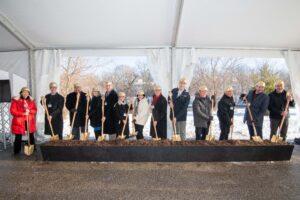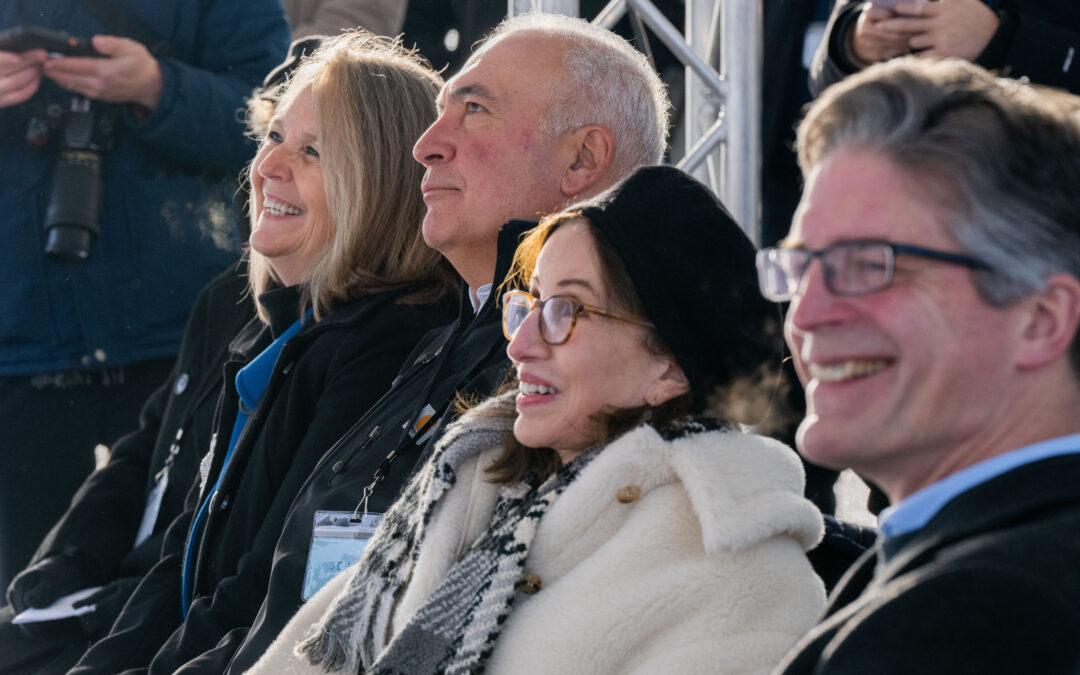 DTE joined The Lower Town Riverfront Conservancy today to break ground on Broadway Park West, a transformational project that will convert an unused former DTE operational site into a world-class public space in Ann Arbor.
DTE joined The Lower Town Riverfront Conservancy today to break ground on Broadway Park West, a transformational project that will convert an unused former DTE operational site into a world-class public space in Ann Arbor.
This project will convert a 110-year old site that joined the DTE family decades ago as a Michigan Consolidated Gas Company Service Center. In 2009, DTE closed and demolished the remaining buildings and has since conducted extensive remediation so the site could ultimately be repurposed as a public place to be enjoyed by Ann Arbor residents. The company sold the property to the Roxbury Group with the intention of this exact project.
Broadway Park West is located along the Huron River at Broadway Street in Ann Arbor.
The initial phase of the park is slated to open by early 2024. The finished project will connect miles of pathways, and include an ice-ribbon, a pedestrian bridge to the Argo Cascades, event lawns, and a year-round pavilion for community gatherings and entertainment.
The centerpiece of the park will be the Commons, a two- acre, tree-lined elliptical lawn that will sit adjacent to a 1,200-foot riverfront trail, connecting Broadway Park West to the Washtenaw County’s Border to Border trail system. When complete, the project will open up riverfront land that has been closed to the public since the 19th century.
“DTE has been committed to a redevelopment of this site from the start, partnering with the city of Ann Arbor and community members to preserve the urban greenspace bordering the riverfront and creating a world-class public park,” said Jerry Norcia, DTE Chairman and CEO. “This is an exciting example of an adaptive reuse project, which provides important access to the public and serves as a model for the rest of the state. We’re thrilled that this project will serve as a catalyst for continued growth and economic development in this region.”
Ann Arbor Mayor Christopher Taylor agreed.
“This project is incredibly important for Ann Arbor,” he said. “Ensuring that this riverfront property is available for the public to enjoy in perpetuity was a major factor in why council approved this project so overwhelmingly. We appreciate DTE for their foresight and openness throughout this process. The public-private partnership between the conservancy, the city and the developers meets so many of our objectives as we all work to determine the best future for this critical site.”
As part of initial planning for the site, Roxbury, in collaboration with DTE, hosted over 60 meetings involving more than 400 individuals from the neighborhoods, community groups and local businesses. The plan that emerged from that effort established priorities for the site and was ultimately approved by the Ann Arbor City Council on a 10-1 vote.
A critical part of the city’s approval process for the project was the requirement that the developer form an independent 501c3 non-profit entity that would ultimately be responsible for the funding and oversight of the public space. In accordance with that requirement, the Lower Town Riverfront Conservancy was formed in 2020. Since then, the Conservancy has formed an independent Board of Directors, established a collaboration with the Ann Arbor Area Community Foundation and secured both public and private funding necessary to construct the public space components required by the City.
Marie Klopf is serving as the Conservancy’s first president, having been appointed to that role in late-2022. Klopf has a long history of service to the Ann Arbor community. A resident of Ann Arbor, Marie served as President/CEO of the Ann Arbor Art Center for more than a decade. In that role, she led a significant capital campaign to acquire and renovate two downtown buildings to serve as the Center’s program and gallery space and increased program funding from grants, foundations, by more than 500%.
“The Lower Town Riverfront Conservancy is extremely grateful for the strong support it has received both from the State of Michigan and our private donors toward the development of this long-awaited public space and trail project for the Ann Arbor community,” she said. “When we finish construction of the public space next year, it will not only transform over seven acres of blighted and historically industrial land into a world-class public space but will serve as a model in our city for how public, private and philanthropic sectors can collaborate to achieve community goals.”
The public space is the first phase of the larger redevelopment plan for the 14-acre site. Once the public space and related infrastructure improvements are completed, work will begin on the next phase, which will include approximately 100 for sale residences, a boutique hotel and approximately 20,000 square feet of neighborhood retail.
